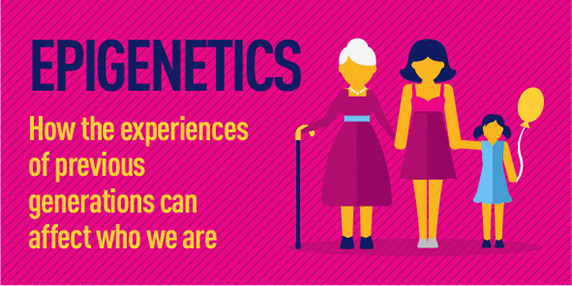We are comprised of tens of thousands of genes. These genes, our DNA, decide who we are: our mental, physical, and emotional characteristics.
The genes are influenced by proteins, and the proteins create our cellular composition.
But – and here’s the important point for human rights advocates – the proteins are influenced by our external environment. This means that if we experience trauma, hunger, or prolonged stress, these factors ultimately will influence our mental, physical, and emotional characteristics. Our DNA itself doesn’t change, but the way that DNA is activated by our cells changes.
Because we are biological creatures, our offspring inherit our DNA. This means that the stresses from the external environment, also, will become genetically inherited. So along with passing down blue eyes or blond hair, we can also pass on an inheritance of the trauma of genocide.
The science that studies this transmission is called epigenetics. This short video gives an explanation of this complex phenomenon.
One of the tools of genocide is starvation. Withholding food is cheaper than using bullets or poison gas. Starvation has been used against Jews, American Indians, Armenians, and Cambodians, and is being used today in Syria, North Korea, and Darfur. It is one of the first signs of genocide.
Starvation causes a biological change in our proteins that can be passed down for as many as four generations. These changes cause an increased likelihood of mental, physical, and emotional health issues for survivors’ children, their children’s children- and beyond.[1]
Our documentary, Genocide and Starvation: Dying of Hunger, will explore the use of starvation in genocide and its effects on later generations. The film will also give strategies to prevent the use of starvation as a tool of genocide.
To become a sponsor of the film and part of the legacy of a world without genocide, click here.
Articles
Biological mechanism passes on long-term epigenetic ‘memories’.” Science News. March 28, 2016.
Bird, Adrian. “Nature Insights: Epigenetics.” Nature. Vol 447, Issue 7143, pp. 396-440. May 24, 2007.
Cloud, John. “Why DNA Isn’t Your Destiny.” Time Magazine. January 6, 2010.
“Epigenetics and Stress: Baby Blues.” The Economist. February 7, 2013Gallager, James. “Memories’ Pass Between Generations.” BBC. British Broadcasting Corporation. December 1, 2013.
Hemon, Aleksander. “In Sarajevo, A Dancer in the Dark.” The New Yorker. March 30, 2016.
Hughes, Virginia. “Epigenetics: The sins of the father.” Nature. Vol 507, Issue 7490. March 5, 2014.
Kluger, Jeffery. “Genetic Scars of the Holocaust: Children Suffer Too.” Time Magazine. September 9, 2010.
“NIH Announces New Initiative in Epigenomics.” National Institutes of Health. January 22, 2008.
Riddihough, Guy and Laura Zahn. “What is Epigenetics?” Science. Vol 330, Issue 6004, pp. 611. October 29, 2010.
Rothstein, Mark, Yu Cai, and Gary Marchant. “The Ghost in Our Genes: Legal and Ethical Implications of Epigenetics.” Social Science Research Network. February 17, 2014.
“The Rwanda Genocide Left Lasting Marks on the DNA of Traumatized Women and Their Children.” What is Epigenetics. February 1, 2022.
Thomson, Helen. “Study of Holocaust survivors finds trauma passed on to children’s genes.” The Guardian. Guardian News and Media. August 21, 2015.
Wein, Harrison. “Stress Hormone Causes Epigenetic Changes.” National Institutes of Health. September 27, 2010.
Yehuda, Rachel et al. “The Public Reception of Putative Epigenetic Mechanisms in The Transgenerational Effects of Trauma.” Environ Epigenet. July 17, 2018.
Yehuda, Rachel, et al. “Holocaust Exposure Induced Intergenerational Effects on FKBP5 Methylation.” Biological Psychiatry. August 12, 2015.
Yehuda, Rachel. “How Parents’ Trauma Leaves Biological Traces in Children.” Scientific American. July 1, 2022
Zimmer, Carl. “Hope, Hype and Genetic Breakthroughs.” The Wall Street Journal. March 10, 2012.
Technical Articles
For collections of scientific articles, see http://tandfonline.com/toc/kepi20/current and https://scifeeds.com/category/life-science/epigenetics/
Documentaries
“Epigenetics.” Nova on PBS. July 24, 2007.
“Epigenetics: Modern Day Lifestyle and Your DNA.” Riordan Clinic. April 19, 2013.
“Reversing the Epigenetic Effects.” The Raising of America: Early Childhood and the Future of Our Nation.
[1] Yehuda, Rachel, et al. “Holocaust Exposure Induced Intergenerational Effects on FKBP5 Methylation.” Biological Psychiatry. August 12, 2015.







